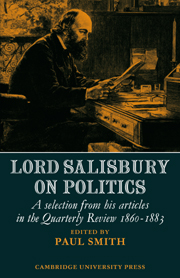Book contents
- Frontmatter
- Contents
- Preface
- List of abbreviations
- Editor's introduction
- Bibliographical note
- ‘The Budget and the Reform Bill’ (April 1860)
- ‘The House of Commons’ (July 1864)
- ‘The Reform Bill’ (April 1866)
- ‘The Change of Ministry’ (July 1866)
- ‘The Conservative Surrender’ (October 1867)
- ‘The Programme of the Radicals’ (October 1873)
- ‘Disintegration’ (October 1883)
- Index
- Cambridge Studies in the History and Theory of Politics
‘The Programme of the Radicals’ (October 1873)
Published online by Cambridge University Press: 06 July 2010
- Frontmatter
- Contents
- Preface
- List of abbreviations
- Editor's introduction
- Bibliographical note
- ‘The Budget and the Reform Bill’ (April 1860)
- ‘The House of Commons’ (July 1864)
- ‘The Reform Bill’ (April 1866)
- ‘The Change of Ministry’ (July 1866)
- ‘The Conservative Surrender’ (October 1867)
- ‘The Programme of the Radicals’ (October 1873)
- ‘Disintegration’ (October 1883)
- Index
- Cambridge Studies in the History and Theory of Politics
Summary
INTRODUCTORY NOTE
Salisbury's October 1873 article was written at a period of crisis in the fortunes of the Liberal government and the Liberal party. The great Gladstone ministry which had come into power with so sweeping a majority in 1868 seemed on the verge of collapse. Its legislative achievements had largely exhausted its mandate and its energies, and had raised the feeling of powerful interests against it. Churchmen had had to swallow Irish disestablishment and the abolition of university tests (both stoutly resisted by Salisbury). The holders of landed property had seen their existing rights menaced by the principles of the Irish Land Act. The army had been disturbed by the abolition of purchase, and the publicans and their customers by the Licensing Act of 1872. On the international scene, some felt, the government had failed to uphold the country's prestige in its dealings with Russia over the Black Sea clauses of the Treaty of Paris and with the United States over the Alabama claims. In March 1873 the ministry had actually been defeated in the Commons over the controversial Irish University Bill, and had resigned, but Disraeli had prudently refused to take office in a minority, and Gladstone had had to go on. The end of the session had been followed by an attempt to renew the government's vitality through a number of ministerial changes. The unpopular H. A. Bruce left the home office for the presidency of the council and a peerage, and was succeeded by the former chancellor, Robert Lowe, Gladstone himself taking the exchequer; and in September John Bright rejoined the cabinet he had left in November 1870, as chancellor of the duchy of Lancaster.
- Type
- Chapter
- Information
- Lord Salisbury on PoliticsA selection from his articles in the Quarterly Review, 1860-1883, pp. 292 - 334Publisher: Cambridge University PressPrint publication year: 1972

